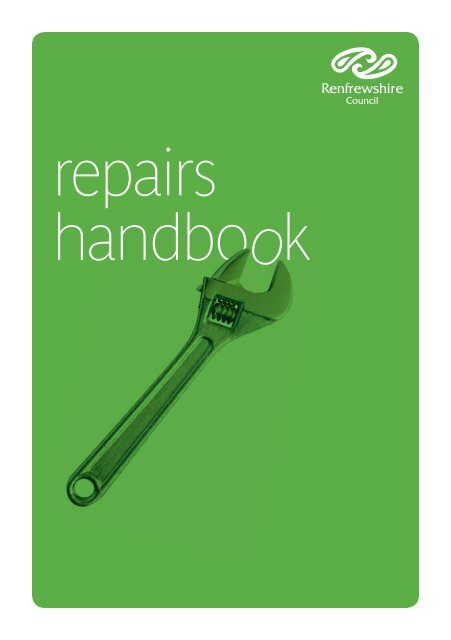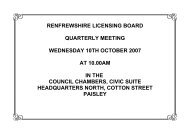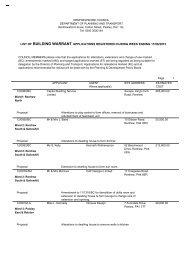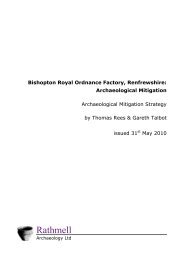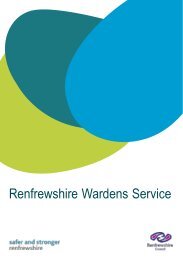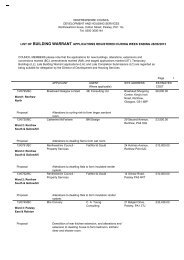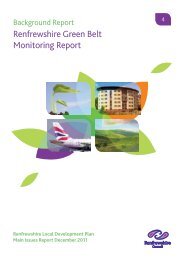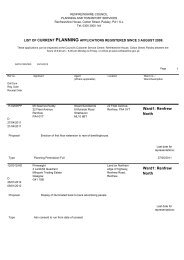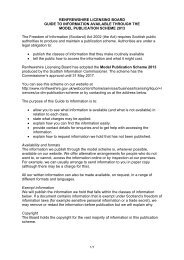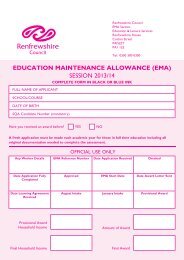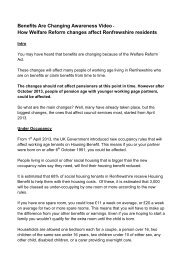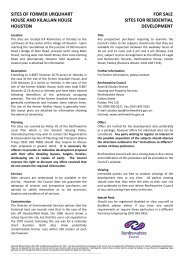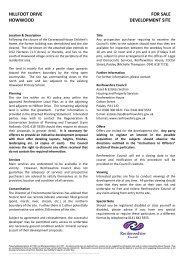repairs handbook - Renfrewshire Council
repairs handbook - Renfrewshire Council
repairs handbook - Renfrewshire Council
You also want an ePaper? Increase the reach of your titles
YUMPU automatically turns print PDFs into web optimized ePapers that Google loves.
epairs<br />
<strong>handbook</strong>
This <strong>repairs</strong> <strong>handbook</strong> has essential information about<br />
getting <strong>repairs</strong> done in your property.<br />
It tells you how to report a repair, the timescales for <strong>repairs</strong><br />
being done and important safety information. There’s also<br />
a useful section on how to fix minor faults.<br />
For more information about <strong>repairs</strong>, visit us online at<br />
www.renfrewshire.gov.uk<br />
Contents<br />
Repairs information........................................................................3<br />
What <strong>repairs</strong> are we responsible for?.....................................................3<br />
What are you responsible for?.................................................................4<br />
Reporting your <strong>repairs</strong>............................................................................... 5<br />
Out-of-hours emergency <strong>repairs</strong>.............................................................6<br />
When will my repair be carried out?...................................................... 7<br />
Your Right to Repair ..................................................................................9<br />
Repairs covered by the scheme.............................................................10<br />
Will I have to pay for any <strong>repairs</strong>?..........................................................11<br />
Common <strong>repairs</strong>........................................................................................11<br />
Gas safety checks...................................................................................... 12<br />
Home safety............................................................................................... 13<br />
Our staff...................................................................................................... 13<br />
Customer satisfaction.............................................................................. 14<br />
Handy hints...................................................................................15<br />
Gas............................................................................................................... 16<br />
Electricity.....................................................................................................17<br />
Plumbing..................................................................................................... 19<br />
Condensation.............................................................................................22<br />
Lost keys......................................................................................................23<br />
What <strong>repairs</strong> are we responsible for?<br />
As your landlord, the <strong>Council</strong> has a legal duty to repair and<br />
maintain your property.<br />
We will carry out certain <strong>repairs</strong> to your property to make sure<br />
it is maintained to a safe standard.<br />
We are responsible for:<br />
Outside<br />
• Roof and chimneys<br />
• Drains, gutters and rainwater pipes<br />
• Walls and windows<br />
• External doors and frames<br />
• Boundary walls, fences and paths<br />
• Bin areas and the poles supporting washing lines<br />
Inside<br />
• Walls and ceilings<br />
• Heating and hot water systems<br />
• Plumbing systems<br />
• Electrical wiring, sockets, light fittings and hard wired<br />
smoke detectors<br />
• Kitchen and bathroom fittings<br />
• Doors and surrounds inside your home<br />
We are also responsible for communal areas around the property.<br />
We will maintain common entrances (including door entry<br />
systems), halls, stairways, lifts and other communal areas to make<br />
sure they are in good condition. However, this may be a joint<br />
responsibility if other owners are involved.<br />
2<br />
3
What are you responsible for?<br />
As a tenant, you are responsible for minor <strong>repairs</strong> such as:<br />
• repairing or replacing any minor fixtures and fittings such<br />
as curtain rails, light bulbs, toilet seats and plugs;<br />
• replacing keys and fitting extra locks;<br />
• maintaining internal decoration;<br />
• maintaining or replacing floor coverings supplied in kitchens<br />
and bathrooms as part of our investment programme;<br />
• maintaining or replacing shower curtains supplied in<br />
bathrooms as part of our investment programme; and<br />
• <strong>repairs</strong> to television aerials and reception equipment (except<br />
in multi-storey flats and sheltered housing complexes).<br />
You must also:<br />
• report any damage or <strong>repairs</strong> needed to your home or<br />
communal areas;<br />
• take care of your home, including carrying out minor <strong>repairs</strong><br />
and decorative work as described above;<br />
• allow us access to your property so we can carry out <strong>repairs</strong>,<br />
inspections, maintenance and annual gas servicing;<br />
• tell us as soon as possible about any alterations you wish to<br />
carry out in your home and get our permission before they<br />
are carried out; and<br />
• report any criminal damage or vandalism to your home to us<br />
and the police, and always remember to get a crime reference<br />
number.<br />
You are also responsible for <strong>repairs</strong> which have been caused by<br />
misuse, neglect or damage by you, your family or any visitors to<br />
your home. If we repair this damage, you will be responsible for<br />
paying the cost of these <strong>repairs</strong>.<br />
For more information on repair responsibilities, our Housing<br />
Repairs Policy is available at www.renfrewshire.gov.uk<br />
Reporting your <strong>repairs</strong><br />
There are a range of easy ways for you to report a repair.<br />
You can report by phone:<br />
• Call the Repair Line on 0300 300 0300.<br />
• Use the freephone Repairs Direct telephones in the Johnstone<br />
and Renfrew neighbourhood offices and the Paisley Customer<br />
Service Centre.<br />
You can report online:<br />
• Fill in an online <strong>repairs</strong> request at www.renfrewshire.gov.uk<br />
When you contact us to report a repair, you’ll receive an<br />
appointment for the repair to be completed by a tradesperson<br />
or, if it needs to be inspected first, a visit from a <strong>repairs</strong> and<br />
maintenance officer.<br />
When reporting a repair, please make sure that you:<br />
• arrange the appointment at a time when it is convenient<br />
for you to be in the house;<br />
• give a contact number in case we need to reschedule the<br />
work; and<br />
• let us know about any disability or impairment that may<br />
affect our ability to gain access to the property, so that<br />
we can act accordingly.<br />
4<br />
5
Once you have an appointment time, there are a number of things<br />
you can do to make sure we can carry out our job as quickly,<br />
effectively and safely as possible.<br />
We need you to:<br />
• make sure there is a responsible adult present to allow our<br />
tradesperson access to the repair;<br />
• clear the area around the repair before our tradesperson<br />
arrives to carry out the work (this may include uplifting<br />
carpets or laminate flooring, clearing work surfaces, emptying<br />
cupboards, taking down curtains or moving furniture away<br />
from the area); and<br />
• keep pets and young children away from the area of the repair<br />
work whilst work is in progress.<br />
If you’re unable to keep an appointment, please let us know on<br />
0300 300 0300 and we will be happy to arrange an alternative<br />
time to suit you.<br />
If you don’t notify us and we attend to carry out the repair but<br />
cannot access your home, the repair request will normally be<br />
cancelled and you will need to call and arrange a new appointment.<br />
Out-of-hours emergency <strong>repairs</strong><br />
Some emergency <strong>repairs</strong> are available 24 hours a day, every day<br />
of the year.<br />
Emergency <strong>repairs</strong> will be attended to outwith normal working<br />
hours only when:<br />
• there is a serious risk to health and safety;<br />
• there is a serious risk to the structure of the property; or<br />
• the property is not secure.<br />
If a serious fault occurs outwith normal working hours, and it is<br />
not safe to wait until the next working day, you should call us on<br />
0300 300 0300. If the repair does not qualify as an out-of-hours<br />
emergency and does not require immediate attention, you will<br />
be given an appointment for the repair to be carried out the<br />
following day.<br />
When will my repair be carried out?<br />
Repairs are split into four groups and the response time for each<br />
one is different.<br />
Emergency <strong>repairs</strong><br />
These are <strong>repairs</strong> where there is a serious threat to health and<br />
safety or where we need to take quick action to prevent damage<br />
to your home or a neighbouring property.<br />
Emergency <strong>repairs</strong> will be attended to and made safe within one<br />
day of being reported and, where possible, we will carry out the<br />
full repair.<br />
If this is not possible, we may carry out temporary <strong>repairs</strong><br />
immediately to make the situation safe, and then return to<br />
complete the repair.<br />
Urgent <strong>repairs</strong><br />
These are <strong>repairs</strong> which are not emergencies, but which need to<br />
be carried out quickly to prevent more damage to your home.<br />
Urgent <strong>repairs</strong> will be carried out within 5 working days of being<br />
reported.<br />
6<br />
7
Routine <strong>repairs</strong><br />
These are everyday <strong>repairs</strong> which are required as a result of normal<br />
wear and tear to a property.<br />
Routine <strong>repairs</strong> will be carried out within 15 working days of being<br />
reported.<br />
Programmed <strong>repairs</strong><br />
These are generally non-urgent, general maintenance <strong>repairs</strong> and<br />
many of these jobs will involve renewing items, working at height<br />
or common <strong>repairs</strong> involving owners.<br />
Sometimes it is better to carry out <strong>repairs</strong> (particularly larger scale<br />
<strong>repairs</strong>) on a programmed basis rather than carrying out individual<br />
responsive <strong>repairs</strong>.<br />
We will inspect all jobs which fall into this category before we<br />
programme the work. The length of time to complete<br />
programmed <strong>repairs</strong> depends on the volume and type of work<br />
required, but generally we would hope to complete these works<br />
within approximately three months.<br />
For more information on different types of <strong>repairs</strong>, visit us online<br />
at www.renfrewshire.gov.uk<br />
Your Right to Repair<br />
The Housing (Scotland) Act 2001 gives you, as a tenant, the right<br />
to have small urgent <strong>repairs</strong> carried out within a given timescale.<br />
The Right to Repair scheme covers certain <strong>repairs</strong> up to the value<br />
of £350 – if we do not carry out the repair within the set timescale,<br />
you may be entitled to compensation.<br />
To qualify for the Right to Repair scheme, the repair must:<br />
• have an estimated value of less than £350; and<br />
• be included in the table below (‘Repairs covered<br />
by the scheme’).<br />
If we do not start the repair within the set timescale you have the<br />
right to arrange for an alternative contractor from our approved<br />
list of contractors to carry out the repair. You cannot use a<br />
contractor who is not on the <strong>Council</strong>’s approved list.<br />
If we fail to carry out a qualifying repair within the maximum time<br />
allowed, you will be entitled to £15 compensation. You will then be<br />
entitled to a further £3 per day for every day the repair remains<br />
outstanding, up to a maximum of £100.<br />
The Right to Repair does not apply if:<br />
• the date for repair was extended because you asked for<br />
an alternative appointment for repair work;<br />
• the repair has an estimated value of £350 or more; or<br />
• you fail to provide access for an inspection or repair to be<br />
carried out, having been given a reasonable opportunity<br />
to do so.<br />
For more information on your Right to Repair, visit us online at<br />
www.renfrewshire.gov.uk. Alternatively you can find out more<br />
at the Scottish Government website www.scotland.gov.uk<br />
8<br />
9
Repairs covered by the scheme<br />
1 working day means by the end of the next working day, we must<br />
have completed the job or made it safe. For example, if a repair<br />
was reported on Tuesday, we would have until 5pm Wednesday<br />
to attend (excludes weekends and public holidays).<br />
Fault<br />
Maximum<br />
period for<br />
completion in<br />
working days<br />
Blocked flue to open fire or boiler 1<br />
Blocked, leaking or foul drains, soil stacks or toilet pans 1<br />
where there is no other toilet in the house<br />
Blocked sink, bath or basin 1<br />
Electric power:-<br />
loss of electric power<br />
partial loss of electric power<br />
Insecure external window, door or lock 1<br />
Unsafe access path or step 1<br />
Significant leaks or flooding from water or heating<br />
1<br />
pipes, tanks, cisterns<br />
Loss or partial loss of gas supply 1<br />
Loss or partial loss of hot water and/or heating where 1<br />
no alternative heating is available<br />
Toilet not flushing where there is no other toilet in the 1<br />
house<br />
Unsafe power or lighting socket or electrical fitting 1<br />
Water supply:-<br />
loss of water supply<br />
1<br />
partial loss of water supply<br />
3<br />
Loose or detached banister or hand rail 3<br />
Unsafe timber flooring or stair treads 3<br />
Mechanical extractor fan in internal kitchen or<br />
bathroom not working and no alternative ventilation<br />
1<br />
3<br />
7<br />
Will I have to pay for any <strong>repairs</strong>?<br />
You are responsible for any damage that you, your family or visitors<br />
to your home have caused.<br />
If we carry out a repair for such damage you will be asked to pay<br />
for it. We will give you an estimate for the repair, including an<br />
administration charge.<br />
If you believe the damage was caused by vandalism, you must<br />
report the matter to the police and get an incident reference<br />
number.<br />
When you move out of your property, you must:<br />
• leave the property in a clean and tidy condition;<br />
• remove all your belongings;<br />
• make sure decoration inside the property is in a<br />
reasonable condition;<br />
• do any <strong>repairs</strong> you are responsible for; and<br />
• remove any fixtures and fittings you have installed without<br />
our permission and put right any damage.<br />
If you fail to leave the property in the condition detailed above,<br />
we will carry out the work required and you will be recharged for<br />
the cost.<br />
Common <strong>repairs</strong><br />
Responsibility for <strong>repairs</strong> and maintenance of common areas<br />
within flats is shared between all the owners, including the <strong>Council</strong>.<br />
Common areas include parts such as roofs, external walls, gutters<br />
and close and stair areas.<br />
To get non-urgent <strong>repairs</strong> done to common areas, a majority<br />
decision is needed, in line with the Tenements (Scotland) Act 2004.<br />
10<br />
11
Where common <strong>repairs</strong> are required, we will work with owners<br />
to encourage them to participate in any proposed improvement<br />
works in compliance with the legislation. This can sometimes<br />
cause delays in work being carried out to <strong>Council</strong>-owned<br />
properties, particularly where the <strong>Council</strong> is not the majority<br />
owner in the building.<br />
For more information on common <strong>repairs</strong>, visit us online at<br />
www.renfrewshire.gov.uk<br />
Gas safety checks<br />
By law, the <strong>Council</strong> is responsible for carrying out annual gas<br />
services and other safety checks. As your landlord, we have a legal<br />
obligation to ensure our gas appliances (gas fires or gas central<br />
heating installed by us) and flues are maintained in a safe manner.<br />
We service our gas appliances every year to keep them in good<br />
working order and safe for your use. Unsafe systems are dangerous<br />
and can have potentially fatal consequences, so it is very<br />
important that you allow us access to your home.<br />
This is a legal requirement – you must allow us reasonable access<br />
to your home so that we can carry out these essential checks.<br />
If you don’t allow us access, we will have to arrange for a forced<br />
entry and you will have to pay any costs, such as <strong>repairs</strong> to the<br />
door.<br />
If you install a gas heater or gas water-heating appliance with<br />
written permission, we will maintain and service it. Gas appliances<br />
will become the property of the <strong>Council</strong> <strong>repairs</strong> service at the end<br />
of your tenancy. If you wish to take such appliances with you at<br />
the end of your tenancy, a suitable, fit-for-purpose heating<br />
appliance must be left in its place and properly installed.<br />
When carrying out gas safety checks, we will shut down any<br />
unsafe gas appliances that we have no responsibility to maintain.<br />
Home safety<br />
We do not insure the contents of your house or your personal<br />
possessions.<br />
We recommend that you insure your possessions against loss<br />
by fire, flood, theft and accident.<br />
From as little as 75p per week, we can offer home contents<br />
insurance for a small additional charge on your rent.<br />
If you would like to join our insurance scheme, call into any<br />
of our neighbourhood offices or fill in an online form at<br />
www.renfrewshire.gov.uk<br />
Our staff<br />
All Building Services employees and workers employed by our<br />
contractors carry an identification card.<br />
Before you let anyone into your home, you should ask to see<br />
their identity card.<br />
If you are unsure about anyone requesting access to your home,<br />
please contact us on 0300 300 0300 before allowing them into<br />
your property.<br />
Our staff will always conduct themselves in a professional, quiet<br />
and orderly manner and try to minimise disruption and mess.<br />
We have developed a Customer Respect Statement which all<br />
Building Services employees adhere to. This is available online<br />
at www.renfrewshire.gov.uk<br />
12<br />
13
Customer satisfaction<br />
We are committed to providing a quality <strong>repairs</strong> service and want<br />
to make sure you are satisfied with work carried out in your home.<br />
If our service does not meet the standard expected, it is important<br />
that you let us know as quickly as possible so that we can put<br />
things right.<br />
If, for any reason, you are not satisfied with the service you have<br />
received, you can let us know through any of the methods via<br />
which <strong>repairs</strong> can be reported. We can normally solve problems<br />
quickly and easily at this stage.<br />
However, if you are still unhappy with our service, you can make<br />
a formal complaint by completing the online complaints form<br />
available at www.renfrewshire.gov.uk<br />
Our Customer Service Team will investigate your complaint and,<br />
where appropriate, correct the problem and take steps to make<br />
sure it does not happen again. We will also let you know the<br />
outcome of your complaint.<br />
handy<br />
hints<br />
14<br />
15
Gas<br />
If you suspect you have a gas leak, you should contact TRANSCO,<br />
the national gas emergency service on 0800 111 999 and take the<br />
following steps:<br />
• Turn off the gas supply at the meter. Turn the handle at the<br />
meter to the horizontal position to turn it off.<br />
• Open all windows and doors to allow any gas to escape<br />
• Do not use any naked flames<br />
• Do not turn any sockets or lights on or off<br />
If you have no gas or have high or low pressure, phone TRANSCO<br />
on 0800 111 999.<br />
Electricity<br />
If you have no electricity to all or part of your property, the first<br />
thing you should do is check the trip switch.<br />
This can sometimes happen when there is a problem with your<br />
electrics and a switch is tripped to break the circuit.<br />
This can happen when:<br />
• there are too many appliances on a circuit and it’s overloaded<br />
• an appliance is faulty or hasn’t been used properly<br />
• water has leaked into a circuit or has spilled onto a plug<br />
• a light bulb has blown<br />
No heating or<br />
hot water<br />
Pilot light has<br />
gone out<br />
Radiators are<br />
not very hot<br />
Check the pilot light has not gone out<br />
Check the timer is set correctly<br />
Check the isolation switch<br />
Press the reset button on the boiler<br />
Check the timer is set correctly<br />
Other Call the Repairs Line on 0300 300 0300<br />
Trip switches<br />
The consumer unit (fuse box) is next to your<br />
electricity meter. If any of the switches are<br />
down, push them to the up position. (The main<br />
switch may need to be turned off then on<br />
again to reset the system).<br />
16<br />
17
If this doesn’t fix the problem, you should then<br />
try the following:<br />
No electricity (power points and lights) at all<br />
Card meter<br />
Are your<br />
neighbours<br />
affected?<br />
(you could also<br />
check the<br />
stairwell or<br />
communal<br />
areas)<br />
The power will be cut off if you do not have<br />
enough credit on your card meter; you will<br />
need to get more credit to reinstate the supply.<br />
Yes – Call Scottish Power on 0845 272 7999<br />
No – It is likely that the fault starts from<br />
inside your home, call the Repair Line on<br />
0300 300 0300 stating that you have no<br />
electricity at all. An emergency electrician will<br />
come and investigate the problem further.<br />
No electricity (power points or lights) to part of the property<br />
Is it the<br />
electrical<br />
supply or the<br />
appliance?<br />
Electrical Supply – If lighting is affected in a<br />
part of your home, or if no appliance will work<br />
in the affected socket, call the Repair Line on<br />
0300 300 0300 stating that you have a<br />
partial loss of electricity. They will arrange an<br />
appointment for an electrician to call.<br />
Appliance – If only one appliance is not<br />
working, it may be faulty. If other appliances<br />
work in the same socket, you should get the<br />
appliance checked by a qualified electrician.<br />
Plumbing<br />
Stopcock<br />
Frozen pipes<br />
No water<br />
This is a tap that controls water flowing from<br />
the mains into your home. Stopcocks are often<br />
located in the hallway or under the kitchen<br />
sink; there is sometimes more than one<br />
stopcock to allow you to turn water off to part<br />
of the property.<br />
If you have a leak you should turn the water off<br />
at the stopcock to prevent any more water<br />
leaking. Turn the mains stopcock to the right<br />
(clockwise) to turn it off.<br />
A leak may not stop immediately because<br />
water is still flowing from the header tank or<br />
the hot water tank; you should turn on other<br />
taps to drain down the tank. Check immersion<br />
heater is switched off before the hot water<br />
tank is drained down. In the case of gas heating<br />
switch off the water heater.<br />
If the temperature inside a property drops<br />
below freezing, water may freeze inside the<br />
pipes. When the ice thaws out it may cause<br />
pipes to burst.<br />
To prevent frozen pipes always ensure that you<br />
turn the water off at the mains or leave central<br />
heating on if the property is going to be<br />
unattended for long periods of time during the<br />
winter months.<br />
Check the stopcock and then check to see if<br />
your neighbours have water. If they don’t there<br />
may be a burst mains, contact Scottish Water<br />
on 0845 600 8855 to report it, otherwise call<br />
the Repair Line for advice.<br />
18<br />
19
Taps won’t<br />
turn off<br />
Water<br />
discoloured<br />
Blocked toilet<br />
Contact us and we will arrange an appointment<br />
to repair it.<br />
If the water is running very quickly (full bore)<br />
you may need to turn the water off at the<br />
stopcock. (Sometimes there is a separate<br />
stopcock for the kitchen sink, this is usually<br />
under the sink) You will be able to turn the<br />
stopcock on if you need water in the meantime.<br />
If your water is a different colour to normal,<br />
there may be a problem with the water supply.<br />
You should contact Scottish Water on<br />
0845 600 8855 for further advice.<br />
As a responsible tenant you should ensure that<br />
your toilet does not become blocked due to<br />
foreign objects being flushed down it.<br />
Common examples are:<br />
• Children’s toys<br />
• Nappies<br />
• Entire toilet rolls<br />
• Kitchen roll<br />
• Paper<br />
• Plastic toilet fresheners<br />
If a foreign object causes a blockage, the cost<br />
of the repair will be recharged to you. If an<br />
object accidentally falls into the toilet bowl,<br />
you should always remove it by lifting it out,<br />
NEVER try to flush it away<br />
It is your responsibility to clean the shower<br />
head.<br />
Blocked sink<br />
or bath<br />
Toilet won’t<br />
flush<br />
Water from<br />
above<br />
Using a plunger, sink un-blocking agent or<br />
sodium bicarbonate can often clear blocked<br />
sinks or baths quickly and easily. Some<br />
blockages will also clear by themselves if<br />
they are left for a few hours.<br />
If this is your only toilet, we will fix the fault<br />
by the end of the next working day. In the<br />
meantime toilets can be flushed manually<br />
by pouring a bucket of water down it after<br />
each use.<br />
If you are on the top floor, a leaking roof could<br />
cause this, we will arrange for a temporary<br />
roofing repair. Please be aware that we cannot<br />
go onto a roof in the dark, during high winds or<br />
when it is raining for health and safety reasons.<br />
If there is another flat above you, please try<br />
speaking to the occupier and get them to turn<br />
off their water. If they are not in, check the<br />
flats on both sides and the floor above, as<br />
sometimes the leak can travel some distance<br />
before it becomes noticeable.<br />
Where the property is privately owned, we<br />
cannot break into an empty property to repair<br />
a leak without first going through a legal<br />
process. This may take some time.<br />
Blocked<br />
shower head<br />
20<br />
21
Condensation<br />
Condensation happens when moist air comes into contact with a<br />
cool surface and water droplets form. This is what happens when<br />
your bathroom mirror steams up.<br />
When this happens on your window, the glass mists up and drops<br />
of water run down the window. When it happens on a wall, the<br />
wall soaks up the moisture and becomes damp. Mould could then<br />
grow on the damp areas.<br />
We also put lots of moisture into the air when we take a bath or<br />
shower, cook or wash the dishes. Moisture is also produced when<br />
we dry clothes indoors or use an unvented tumble dryer.<br />
Condensation can increase in particularly cold weather therefore<br />
it is important that you keep your heating on at low throughout<br />
the day.<br />
How to remove mould<br />
The best way of tackling mould is to reduce the condensation<br />
levels and prevent it from growing in the first place.<br />
To kill and remove mould, wipe down or spray walls and window<br />
frames with a fungicidal wash that carries a Health and Safety<br />
Executive (HSE) ’approval number’, and ensure that you follow<br />
the instructions for its safe use. These fungicidal washes are<br />
often available at local supermarkets and DIY stores.<br />
Dry-clean mildewed clothes, and shampoo carpets. Do not try<br />
to remove mould by using a brush or vacuum cleaner.<br />
Prevent condensation<br />
To help reduce the risk of condensation in your home:<br />
• Keep a window open when drying clothes indoors or<br />
ensure your window vents are open.<br />
• Don’t dry clothes over warm radiators.<br />
• Keep the kitchen door closed when cooking.<br />
• Keep lids on pots and pans when cooking.<br />
• Keep the bathroom door closed when running a bath<br />
and bathing.<br />
• Don’t overfill cupboards and wardrobes – make sure air<br />
can circulate.<br />
Lost keys<br />
If you lose your keys or get locked out you will be charged for<br />
any costs to do with gaining access to your property.<br />
This will include:<br />
• A call out fee<br />
• Cost of replacing all locks<br />
• Cost of repairing any damage to the door<br />
• Cost of repairing any damage to the door frame<br />
• An administration charge<br />
We must attend other emergency <strong>repairs</strong> before attending to<br />
anyone who is locked out, this means you could wait up to six<br />
hours before we are able to gain access to your property.<br />
To avoid this we strongly recommend that you leave a spare set<br />
of keys with family, friends or neighbours.<br />
22<br />
23
Useful telephone numbers<br />
Housing Repairs Line...................................................0300 300 0300<br />
Stair and close lighting................................................0300 300 0300<br />
TRANSCO (national gas emergency helpline)............. 0800 111 999<br />
Scottish Power (emergencies)..................................... 0845 272 7999<br />
Strathclyde Police .........................................................0141 532 2000<br />
Strathclyde Fire and Rescue........................................0800 0731 999<br />
(Community Safety helpline)<br />
Scottish Water (emergency helpline)....................... 0845 600 8855<br />
This document can be made available<br />
in braille, large print or audio.<br />
A summary is also available in these languages on request:<br />
0300 300 0300


